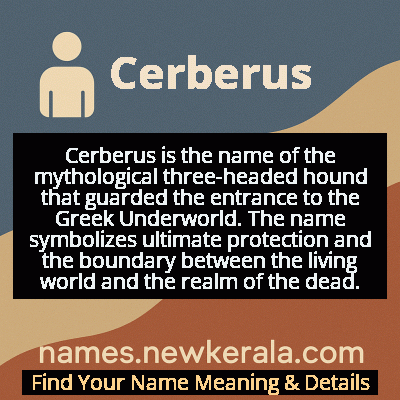Cerberus Name Meaning & Details
Origin, Popularity, Numerology Analysis & Name Meaning of Cerberus
Discover the origin, meaning, and cultural significance of the name CERBERUS. Delve into its historical roots and explore the lasting impact it has had on communities and traditions.
Name
Cerberus
Gender
Male
Origin
Greek
Lucky Number
1
Meaning of the Name - Cerberus
Cerberus is the name of the mythological three-headed hound that guarded the entrance to the Greek Underworld. The name symbolizes ultimate protection and the boundary between the living world and the realm of the dead.
Cerberus - Complete Numerology Analysis
Your Numerology Number
Based on Pythagorean Numerology System
Ruling Planet
Sun
Positive Nature
Leaders, ambitious, highly driven, self-reliant, innovative.
Negative Traits
Overly aggressive, domineering, impatient, selfish.
Lucky Colours
Red, orange, gold.
Lucky Days
Sunday.
Lucky Stones
Ruby, garnet.
Harmony Numbers
2, 3, 9.
Best Suited Professions
Entrepreneurs, managers, engineers.
What People Like About You
Courage, determination, leadership.
Famous People Named Cerberus
Cerberus (Mythological)
Guardian of Hades
Faithfully guarded the gates of the Underworld for eternity
Cerberus (Literary)
Symbolic Character
Central figure in classical literature representing the boundary between life and death
Cerberus (Astronomical)
Asteroid
Celestial body named after the mythological guardian, orbiting between Earth and Mars
Name Variations & International Equivalents
Click on blue names to explore their detailed meanings. Gray names with will be available soon.
Cultural & Historical Significance
The mythological tradition consistently portrays him as both terrifying and dutiful, a creature bound to his master Hades with unwavering loyalty. This duality made Cerberus not just a monster, but a symbol of the natural order—the necessary separation between life and death that even gods respected. In Roman mythology, Cerberus maintained his role but sometimes appeared in more domesticated contexts, such as being lulled to sleep by Orpheus's music. The creature's enduring presence across millennia demonstrates humanity's fascination with boundaries, protection, and the mysteries of what lies beyond death.
Extended Personality Analysis
Individuals or characters named Cerberus typically embody traits of fierce loyalty, unwavering duty, and protective vigilance. Like his mythological counterpart, a modern Cerberus would demonstrate absolute commitment to his responsibilities and those under his protection, often displaying a stern, intimidating exterior that conceals a deeply principled nature. This personality combines immense strength with disciplined restraint, knowing precisely when to unleash power and when to maintain watchful patience. The Cerberus character often possesses a multi-faceted nature—capable of great ferocity when threatened but equally capable of gentle loyalty to those who earn his trust.
This complexity mirrors the mythological hound's multiple heads, representing different aspects of personality: one head for past wisdom, one for present awareness, and one for future foresight. Such individuals typically excel in roles requiring boundary maintenance, security, or the protection of sacred spaces, whether literal or metaphorical. They often display remarkable consistency in their values and actions, much like the eternal guardian of Hades' gates. While they may appear formidable or unapproachable initially, their loyalty once earned is absolute and enduring. The Cerberus personality thrives on purpose and duty, finding fulfillment in protecting what matters most.
Modern Usage & Popularity
In contemporary usage, Cerberus remains primarily a mythological and symbolic name rather than a common personal name. It sees frequent application in business and technology, particularly in security companies, cybersecurity firms, and protective services where the guardian symbolism resonates strongly. The name appears in popular culture through video games, literature, and films, often for characters or entities that serve as guardians, gatekeepers, or formidable obstacles. While extremely rare as a human given name, it occasionally surfaces in creative contexts or among mythology enthusiasts. Recent years have seen increased usage in fantasy literature and gaming, where mythological names enjoy greater acceptance. The name maintains a niche but powerful presence, consistently evoking its core themes of protection and impenetrable security across various modern contexts.
Symbolic & Spiritual Meanings
Cerberus symbolizes the ultimate guardian, representing boundaries that should not be crossed and secrets that must be protected. Metaphorically, he embodies the threshold between known and unknown, conscious and unconscious, life and death. In psychological terms, Cerberus can represent the internal guardians of the psyche—the mechanisms that protect the self from external threats or prevent repressed memories from surfacing. The three heads often symbolize past, present, and future; body, mind, and spirit; or the triple nature of protection: prevention, detection, and response. In organizational contexts, Cerberus represents comprehensive security systems and the concept of layered defense. The creature's snake-adorned mane and dragon tail further enhance his symbolic complexity, representing the chthonic power of the earth and the transformative nature of the underworld journey.

